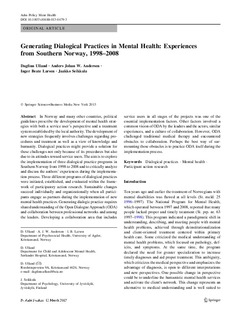| dc.contributor.author | Ulland, Dagfinn | |
| dc.contributor.author | Andersen, Anders Johan W. | |
| dc.contributor.author | Larsen, Inger Beate | |
| dc.contributor.author | Seikkula, Jaakko | |
| dc.date.accessioned | 2013-04-25T11:31:04Z | |
| dc.date.available | 2013-04-25T11:31:04Z | |
| dc.date.issued | 2013 | |
| dc.identifier.citation | Ulland, D., Andersen, A. J. W., Larsen, I. B., & Seikkula, J. (2013). Generating dialogical practices in mental health : experiences from southern Norway, 1998-2008. Administration and Policy in Mental Health and Mental Health Services Research, 1-10. doi: 10.1007/s10488-013-0479-3 | no_NO |
| dc.identifier.issn | 0894-587X | |
| dc.identifier.uri | http://hdl.handle.net/11250/138768 | |
| dc.description | Published version of an article in the journal: Administration and Policy in Mental Health and Mental Health Services Research. Also available from the publisher at: http://dx.doi.org/10.1007/s10488-013-0479-3 | no_NO |
| dc.description.abstract | In Norway and many other countries, political guidelines prescribe the development of mental health strategies with both a service user's perspective and a treatment system established by the local authority. The development of new strategies frequently involves challenges regarding procedures and treatment as well as a view of knowledge and humanity. Dialogical practices might provide a solution for these challenges not only because of its procedures but also due to its attitudes toward service users. The aim is to explore the implementation of three dialogical practice programs in Southern Norway from 1998 to 2008 and to critically analyze and discuss the authors' experiences during the implementation process. Three different programs of dialogical practices were initiated, established, and evaluated within the framework of participatory action research. Sustainable changes succeed individually and organizationally when all participants engage as partners during the implementation of new mental health practices. Generating dialogic practice requires shared understanding of the Open Dialogue Approach (ODA) and collaboration between professional networks and among the leaders. Developing a collaboration area that includes service users in all stages of the projects was one of the essential implementation factors. Other factors involved a common vision of ODA by the leaders and the actors, similar experiences, and a culture of collaboration. However, ODA challenged traditional medical therapy and encountered obstacles to collaboration. Perhaps the best way of surmounting those obstacles is to practice ODA itself during the implementation process. | no_NO |
| dc.language.iso | eng | no_NO |
| dc.publisher | Springer | no_NO |
| dc.subject | dialogical practices | no_NO |
| dc.subject | mental health | no_NO |
| dc.subject | participant action research | no_NO |
| dc.title | Generating dialogical practices in mental health : experiences from southern Norway, 1998-2008 | no_NO |
| dc.type | Journal article | no_NO |
| dc.type | Peer reviewed | no_NO |
| dc.subject.nsi | VDP::Social science: 200::Psychology: 260 | no_NO |
| dc.source.pagenumber | 1-10 | no_NO |
| dc.source.journal | Administration and Policy in Mental Health and Mental Health Services Research | no_NO |
| dc.identifier.doi | 10.1007/s10488-013-0479-3 | |
